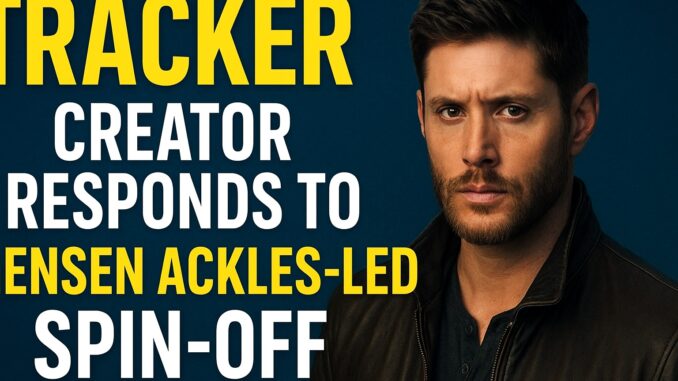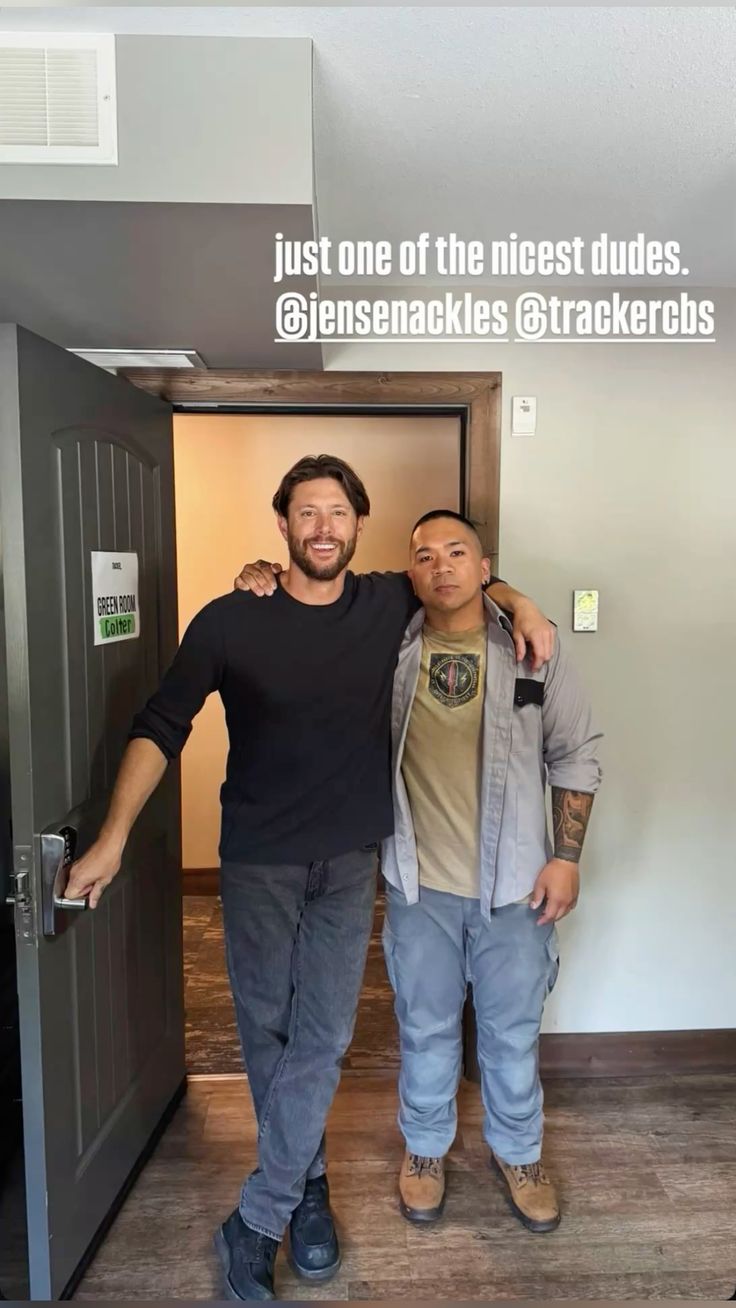
TrackerSeason 3, Episode 2, “Leverage,” marked the end of the latest team-up between Colter Shaw (Justin Hartley) and his brother Russell (Jensen Ackles). Since the duo reconnected early in the series, their relationship has gradually improved, and Russell has developed an appreciation for what his brother does. So deep is the appreciation that he hinted he might be interested in that line of work. Tracker’s showrunner, Elwood Reid, was asked in a new interview whether the show was soft-launching a Russell Shaw Tracker spin-off, given that Ackles is now free to take on another project after Prime Video cancelled his action-thriller Countdown. Elwood admitted they had considered the spin-off, but ultimately, nothing is set for various reasons. He explained:
“We’re cautious. Tracker is Justin’s show, and we never want to do anything that cheapens it. That said, Russell’s military background opens the door to a very different kind of series — one that plays to Jensen’s strengths. We didn’t even ask for permission [to include Russell’s speech in Episode 2]. We just put it in there. As the kids say, I’m manifesting it. It could be a lot of fun if the timing ever lines up.”
Despite being a recurring character, Russell has gained popularity thanks in no small part to Ackles. The actor is known for playing charismatic characters on shows like Supernatural, The Boys, and Countdown. Countdown was cancelled a few weeks ago, but Ackles is set to return to Prime Video sometime next year with his new drama, Vought Rising. The series is a spin-off of The Boys, in which Ackles reprises his role as Soldier Boy alongside Aya Cash as Stormfront. Vought Rising is a “twisted murder mystery about the origins of Vought in the 1950s, the early exploits of Soldier Boy, and the diabolical maneuvers of a Supe known to fans as Stormfront, who was then going by the name Clara Vought.”
If you’re a fan of Tracker (CBS) and you saw a headline about a spin-off led by Jensen Ackles, you’re not alone. Rumour mills have been turned up to full volume after the show seemingly “killed off” the character Russell Shaw—only to have the showrunner throw a wrench in those expectations. Today, we dig into what’s really going on behind the scenes, what the creator says, and why this may or may not become a reality.
The Big Picture: Where Tracker Stands Now
Before we jump into the spin-off rumours, let’s get grounded in the actual state of the show. Tracker is built around Colter Shaw (played by Justin Hartley), a kind of professional “rewardist” who tracks down missing people for cash.
The show has been renewed for at least three seasons.
Enter Russell Shaw: Colter’s older brother, played by Jensen Ackles, who arrived on the scene and shifted the family dynamic.
Russell Shaw’s Journey—From Arrival to “Killing Off”
Who is Russell Shaw?
Russell is Colter’s estranged brother, someone with his own past and a potential side story waiting to be told. The character adds layers to Colter’s narrative and the Shaw family backstory.
The “Killing Off” Moment
While some media headlines suggest Russell was “killed off,” the reality is more subtle. His storyline was left ambiguous—he’s at loose ends, his future is uncertain, and the door is left open for him to re-emerge. Showrunner Elwood Reid acknowledged that Russell’s arc was designed that way.
The Spin-Off Rumour: What’s Being Said?
Showrunner Hints at a Russell Spin-Off
Reid openly admits he’s “always dreamed” of a spin-off centered on Russell. He said that even though Ackles is busy, he hopes the chemistry and character potential might justify a standalone series.
Why This Could Happen (or Not)
Reasons it might happen:
-
Russell is a strong character with built-in connections to Colter and the larger story.
-
Fans like the pairing of Hartley and Ackles.
-
The showrunner is planting “little things” in the narrative to pave the way.
Reasons it might not:
-
Scheduling conflicts: Ackles is engaged in other projects.
-
Narrative risk: A spin-off requires commitment and clarity in story.
-
Strategic decision: The network may prefer to keep the character within the original show.
What the Creator Actually Said (and What It Means)
Getting the Quotes Right
Reid said: “That’s always my dream… Jensen is very well-employed right now… but you never know.”
He also described Russell’s position in the story as “a guy at loose ends… a guy who covers things… unlike Colter…” giving a blueprint for how a spin-off could work.
Parsing the Subtext
What we’re seeing here is a mixture of ambition and caution. The showrunner is clearly open to the idea, but he’s not promising anything. It’s a “let’s hope this works out” scenario. The ambiguity is intentional; it keeps fans engaged and gives flexibility.
Spin-Off Strategy: Insider Insights
Why Networks Explore Spin-Offs
Spin-offs are like reading the extra chapter after the main story ends. They serve several purposes:
-
Capitalising on a popular character.
-
Extending a brand with less risk than an entirely new show.
-
Giving fans more content when their favourites strike a chord.
What Makes a Spin-Off Succeed?
Key ingredients:
-
A distinctive voice that differentiates it from the parent show.
-
A narrative hook that draws new viewers and retains existing fans.
-
Strong scheduling and realistic actor commitments.
In this scenario, Russell Shaw could tick those boxes—but only if the stars align (literally and figuratively).
What This Means for Tracker Season 3
Russell’s Role Coming Into the Next Season
Even if the spin-off doesn’t happen immediately — or at all — the presence of Russell remains a powerful tool for Tracker. Reid revealed they’ve “imagined what a Russell spin-off might look like,” so they can utilise that narrative potential within the main show.
Narrative Flexibility = Storytelling Advantage
By keeping Russell’s arc open-ended, the writers gain flexibility:
-
They can bring him back when Ackles is available.
-
They can test audience reaction to the character’s standalone appeal.
-
They can create tension both within Colter’s story and separate Russell threads.

Fan Reaction & Social Media Buzz
Why Fans Care
-
Ackles has a strong fan base from his earlier work (like Supernatural).
-
The dynamic between Colter and Russell offers emotional weight and mystery.
-
The spin-off idea is tantalising: “What if we get more of Russell doing his own thing?”
Social Media Observations
Fans are already asking:
-
“Will Russell lead his own show?”
-
“Was his exit in Tracker really final?”
-
“How will Colter’s journey change if Russell gets centered?”
These questions fuel speculation and engagement, which is exactly what networks love.
Risks and Rewards of This Approach
The Rewards
-
A successful spin-off might grow the franchise and draw in new viewers.
-
It gives creative teams a fresh setting and perspective while leveraging existing success.
-
For fans, it means more screen time for a favourite character.
The Risks
-
If scheduling doesn’t align, the spin-off may never materialise, leaving promise unfulfilled.
-
A spin-off that fails can dilute the parent show’s brand.
-
Over-promising to fans creates backlash if no follow-through occurs.
Timeline – What to Watch For
Short-Term Indicators
-
Ackles’ availability.
-
Official announcements from networks or studios.
-
Mentions in interviews by showrunners or cast.
Medium-Term Possibilities
-
If Tracker mentions Russell’s new path, job or location in-show, that could hint at spin-off groundwork.
-
Social media teasers or “hidden easter eggs” in upcoming episodes.
-
Renewal or pilot orders announced by the network.
Long-Term Outcomes
-
A formal green-light of a Russell Shaw-centric series.
-
The spin-off launching and then evaluation of ratings and critical response.
-
Potential crossover episodes between Tracker and the spin-off.
How This Fits Into the Bigger TV Landscape
Spin-Off Trends in TV
It’s not new: many successful shows have spawned spin-offs when a side character caught fire (think Better Call Saul from Breaking Bad). When a show builds a strong universe, these opportunities arise.
Why Timing Matters
Timing is everything: If you wait too long, momentum fades; if you rush, you may compromise quality. For Tracker, Russell’s arc is still active which gives the network options.
The Actor’s Role in Spin-Offs
Actors like Ackles bringing gravitas, fan-base, and presence make spin-offs more viable. But their availability and strategic goals (production deals, other series commitments) will always factor in.
What Fans Should Do (and What the Show Should Do)
For Fans
-
Keep watching Tracker and pay attention to Russell’s storyline.
-
Follow credible industry interviews and official announcements (shows like this can go from “maybe” to “yes” quickly).
-
Engage on social media: share your ideas, what you want to see, because fan momentum matters.
For the Showrunners & Network
-
Clearly define Russell’s spin-off potential: what makes it distinct?
-
Ensure Ackles (or whatever lead) is available and committed before hyping the spin-off.
-
Plan cross-promotions or narrative bridges so that if the spin-off happens, the transition feels organic—not tacked-on.
Final Thoughts on the Spin-Off Rumours
Here’s the bottom line: Yes, there is a genuine possibility of a spin-off centred on Russell Shaw—but right now, it remains a hopeful “what-if” rather than a confirmed project. The creator has publicly expressed interest, the narrative groundwork is laid, and fan interest is high. But nothing is locked in. So, the story for now is one of potential rather than promise.
If you’re invested in Tracker, this is a storyline worth following—maybe even one to set a calendar alert for. The next few seasons could lay the foundation for something bigger.
Conclusion
The dynamic between Colter and Russell Shaw has unlocked new storytelling doors for Tracker, and while a Jensen Ackles-led spin-off remains unconfirmed, the showrunner’s comments suggest that the door is intentionally left ajar. The interplay of actor availability, network strategy and narrative momentum will determine whether we see Russell in his own world—but for now, the intrigue is alive. Keep your eyes peeled, because if it happens, you’ll want to say “I called that.”